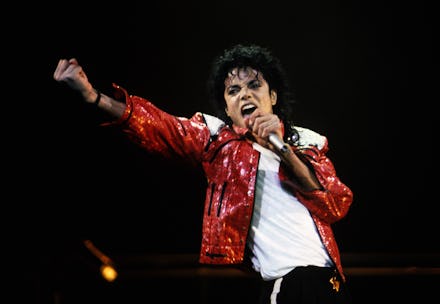Michael Jackson Wasn't White, But Joseph Fiennes Will Play Him in 9/11 TV Drama Anyway

Michael Jackson is perhaps the most iconic black entertainer of all time. Over the course of four decades, he made us fall in love with the Jackson 5, gave us Thriller, taught us how to moonwalk and defined popular music to the point where people across the globe knew the lyrics to his songs. It's that stature that made his personal and allegedly criminal indiscretions so hard to stomach. His morality was often up for debate and, at times, so was his racial identity. But no amount of fame, fortune or controversy would change the fact that Jackson was, and would always be, a black man. And he knew this.
In 1996, Jackson gave a deposition in which he denied persistent rumors that he'd been bleaching his skin and not suffering from a skin disease called vitiligo. "I'm a black American," he told attorneys. "And I'm proud of it."
Just don't tell that to British television producers, who just cast white actor Joseph Fiennes to play Jackson in a TV drama about the singer's long-rumored road trip with Elizabeth Taylor and Marlon Brando during the post-9/11 air travel ban, according to the Guardian.
"Elizabeth, Michael & Marlon is a Sky Arts comedy which takes a light-hearted look at a reportedly true event," a representative from Sky Arts told Mic in an email. "Joseph Fiennes is cast as Michael Jackson. It is part of a series of comedies about unlikely stories from arts and cultural history. Sky Arts gives producers the creative freedom to cast roles as they wish, within the diversity framework which we have set."
"It's a challenge," Fiennes told the media about playing a role in the bizarre story of three superstars left stranded after America was at a standstill. "It's a comedy."
It's an entirely different challenge for black actors, and actors of color in general, to find work. This isn't the first time that a white actor has been written or cast into a story based on people of color. In fact, it happens so often that the phenomenon has a name: whitewashing. Most recently, Ridley Scott's 2015 blockbuster hit featuring Matt Damon, The Martian, was just the latest big-budget film accused of whitewashing roles of people of color, when white actress Mackenzie Davis won the role of Mindy Park, who was originally identified as a Korean-American scientist.
"This insulting practice of whitewashing has got to stop," Aki Aleong, president of the Media Action Network for Asian-Americans, told Deadline at the time. "Alarmingly, it has been increasing in frequency."
Hollywood's practice of whitewashing goes back to its inception, when white actors routinely appeared in blackface and played caricatures of people of color. But in recent years, actors and viewers of color have spoken out against the practice. As of last week, 63,000 people have signed a petition protesting Scarlett Johansson's role in an adaptation of the 1995 sci-fi novel Ghost in the Shell, where the main characters are Japanese.
"What concerns me is the fact that minority actors are so rarely given opportunities in big-budget leading roles," Care2 petition author Julie Rodriguez told ColorLines. "It's a self-defeating cycle: Hollywood insists viewers won't be drawn to unknown minority actors, but they're never given the chance to break out of a narrow set of background roles to prove themselves. Ghost in the Shell could have been a perfect opportunity to buck this trend, but instead promising actresses are being passed over."
One study found that of the 100 top-grossing films in 2012, only 10.8% of speaking characters were black, 5% were Asian and 4.2% were Hispanic. It's that context that at least partially explains actors of color speaking out on #OscarsSoWhite and pushing the Academy of Motion Picture Arts and Sciences to unanimously vote to diversify its membership.
But this latest example of whitewashing shows just how far the industry has to go. After all, this is Michael Jackson, a man whose life story is broadly understood by millions of people. Sure, he was a man of great complexity and sometimes troubling behavior — but there is no denying the fact that he was black.
Fiennes responded to the controversy, telling E! News: "I'm a white, middle-class guy from London. I'm as shocked as you may be." But, he says, the writing is what draws him to the project. "It's kind of off the wall, but the writing is a delight, and the kind of interaction between the three of them is funny, and also full of pathos."
Jan. 27, 2016, 12:16 p.m.: This post has been updated.
Jan. 27, 2016, 3:38 p.m.: This post has been updated.